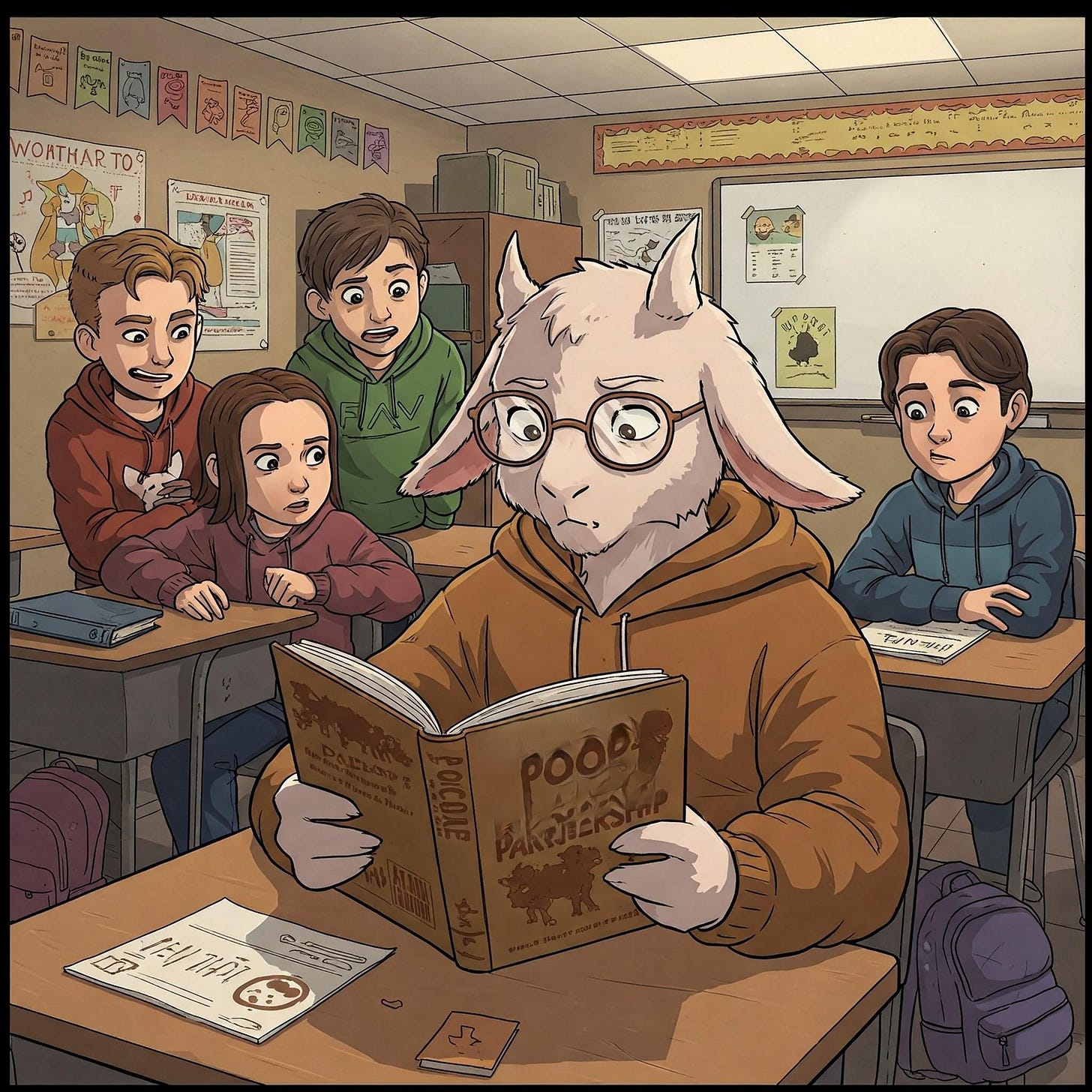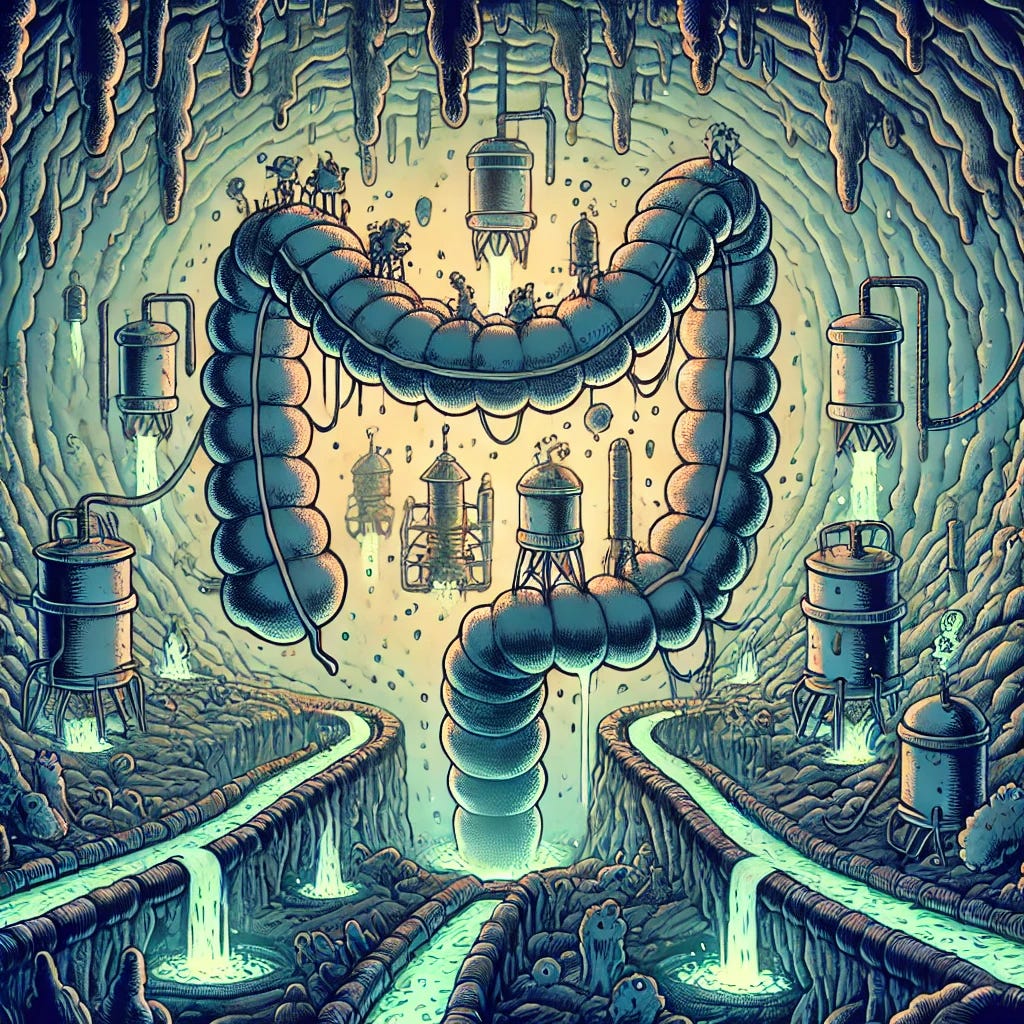Fermenting Farts
Every now and then, a piece kind of writes itself. Piece sounds kind of arrogant, but bear with me: it’ll come out all right in the end.
Knowing me, and knowing that I’ve now written here on Substack for 700 days in a row, you might think that I would have amassed an enormous steaming pile of articles about dookie. Alas, there are only eleven of these pieces of poop. Even still, eleven is a fair number, especially when you consider something the comments on one of those pieces helped me to understand a bit better.
Reading the comments here on Goatfury Writes has its advantages, too: I don’t think of this place as a reflection of my own mind, so much as an opportunity to have great conversations with people about things I care about.
One good question on the article Poop Partnership comes from
(go read something Michael and I wrote together here):On that note… how much of the bacteria in our guts is actually digested and absorbed by us? I guess I always think about it just being the food we eat, broken down with the help of bacteria, but how much nutrition actually comes from the bacteria?
Now, this is interesting enough to start me going! Answering this question is going to take a minute, and the story is really cool. But wait—there’s more!
Brad Kyle (read this piece on proto-punk I wrote for him) is almost exactly 20 years older than me, but we are both the exact same age on the inside. Here’s Brad’s question from that same piece of poop:
I was thinking about poop a couple days ago, Andrew, and of course, I thought of you.....I'm serious. Little did I know this was dropping! My in-head question was its color. I kinda get what makes pee yellow....nitrates, nutrients, water (or lack of, as I have to make sure I'm hydrated, and watch for the lightest-yellow pee I can muster). But, what exactly makes poop the particular brown color (of various shades, granted) it is? I'm hip to the why....I'm sure it has to do with the bacteria, and everything you described, but why brown, as opposed to blue, green, ochre or burnt sienna?
Folks, these are excellent questions. Don’t forget to read the comments.
This combination of questions leads right into the gut microbiome. Here’s how I described it in the article in question:
This is where your partnership with another species really comes into play. Here, a trillion individual bacteria, all living inside your gut, spring into action. Your gut microbiome is made up of around ten times more cells than make up your entire body, so in one sense you’re more bacteria than human, but of course our partnership with bacteria very much makes us who we are.
Those tiny, friendly warriors instantly go to battle on the chyme, slurping away any remaining nutrients and water. These critters… well, there is no delicate way to say this: they eat your poop, and then you poop them out.
Think about this: the microbes inside your body are constantly eating everything nearby. This includes the stuff we eat, but also the stuff the bacteria themselves produce—and, of course, dead bacteria.
A bacterium dying can be a bit like a balloon bursting. All the contents ooze out, and that interior stuff can then be consumed by other bacteria. Is cannibalism a valid survival tactic for bacteria stranded on a desert island? Can these dead bacteria fuel the living bacteria in our gut?
No, not really. There’s just not enough of it. Maybe one bacterium could party on for a few more hours if it stumbled upon one of those burst balloons, but your body is also working to absorb those contents directly.
So, Michael, to answer: how much of the bacteria in our guts is actually digested and absorbed by us? Not much at all, but it definitely does happen.
Of course, we don’t have bacteria in our gut because we want to digest them. We have them in there because whenever we eat plant fibers, those bacteria immediately start the work of fermentation. This process is a bit like a brewpub where grains go in at one end, and booze comes out at the other.
Your own interior brewpub transforms the paste that comes from your stomach (chyme) into short-chain fatty acids your colon can use directly. It is this very same process that provides an answer to Brad’s question, too.
This is all about red blood cells, those wonderful little oxygen-delivery drones we count by the trillions in our bodies. When these cells die, the hemoglobin inside them breaks down into a yellowish substance called bilirubin.
This dead red-blood-cell goo then travels along with the rest of your partially digested food into your gut, where our bacterial soldiers set to work. They convert bilirubin into a brown substance called stercobilin. So, Brad: there’s the short answer.
The longer answer is that if your poop isn’t brown, something may be off. If the bile doesn’t reach your intestines, you might see a more yellowish color, and if the food moves too quickly through the colon, Mr. Hankey might be green or gray colored.
Fermentation is such a superstar of the human body, we can almost forgive all the farts it causes us to produce.




Fantastic! Now I only wish I had jumped on this one when it was fresh! What's really interesting is all those bacteria also has a MAJOR impact on our mental health. It's called Psychobiotics and it's insane how the gut-brain connection works.
The reason I asked the first question is because Cows actually gain most of their nutrients / protien etc. from the bacteria, not the grass itself which is a crazy thing to consider. Same too with some of our primate cousins like a gorilla. Humans have a very short intestine compared to many other vegetarian primates as we evolved this way eating meat, not getting that protein from bacteria.
As a mom of two boys (three when you consider the inside age of my hubby), I am well acquainted with the discussion of farts, poop, belches, and the like. The boys' favorite bedtime stories were: The Gas We Pass and Everyone Poops.
And yet, it's lines like "This process is a bit like a brewpub where grains go in at one end, and booze comes out at the other" that make me glad I'm intermittent fasting right now and only drinking tea instead of eating breakfast while reading this post...